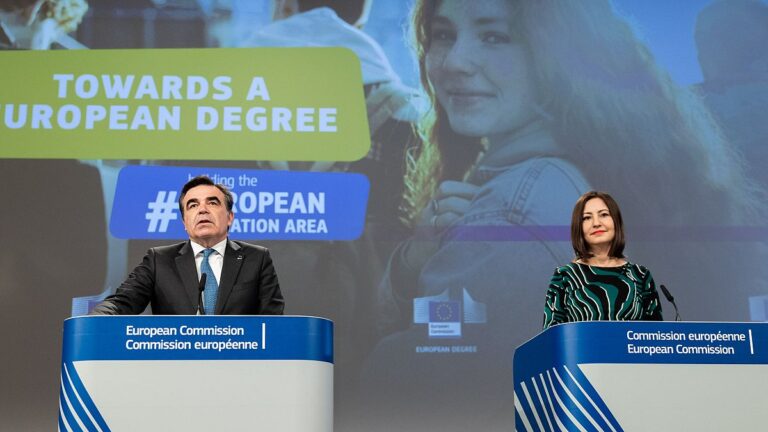Graduates could soon be awarded pan-European degrees from a group of universities as part of new plans announced by the European Commission.
advertisement
Under the proposals announced on Wednesday, universities in EU countries would work together to offer joint research programmes at bachelor’s, master’s and doctoral level, resulting in EU-branded degrees recognised across the bloc.
The scheme will be open to private and public institutions in EU member states and may also include universities in Erasmus+ partner countries.
Announcing the plans, European Commission Vice-President Margaritis Schinas said he was “convinced” that European degrees would be “the next big thing” in helping citizens realise the benefits of European integration.
“I have no doubt that in a few years time, the European degree will be ranked as a concrete European achievement, next to Schengen, Erasmus, the single market and the euro,” Schinas told reporters.
Education and Youth Commissioner Iliana Ivanova said the plan would meet the needs of students, universities and employers and boost Europe’s competitiveness by “securing Europe’s position in the global race for talent”.
But despite their enthusiasm, the pair clearly struggled to explain the need for the new degree or how it would work in practice, as reporters bombarded them with questions seeking clarification.
Currently, there is no automatic EU-wide recognition of degrees, and students must go through complex and costly procedures to have their documents recognised in other countries.
Schinas argued that the system was not meant to “substitute for the recognition of diplomas or professional qualifications” from single institutions but to offer a “selective track” of European degrees, and that the prospect of pursuing a European degree in several member states could attract more talent from outside the region.
No new funding
To obtain a European degree, students are required to study at registered universities in at least two different member states, but no additional budget is allocated to support this.
Asked by Euronews whether the move could exclude students from socially and economically disadvantaged backgrounds and perpetuate elitism, Sinas said “what we are doing here today is only going against an elitist approach,” arguing that such an approach would only open up programs to a certain class of universities in certain countries.
“Contrary to elitist ideas, this is inclusive and open to any university in any member state, to everyone,” Ilyanova said.
“Non-European Ivy League universities are genuinely interested in European degrees because they see this as a promotion opportunity,” Sinas added.
Brussels sees the scheme as a complement to Erasmus+, the EU’s most popular and well-known initiative that allows students to study and work in other European countries. The EU is investing a massive 26.2 billion euros in Erasmus from 2021 to 2027, with students earning up to 390 euros a month in EU-funded grants to support their studies abroad.
Sinas said future students would be able to take advantage of Erasmus scholarships to pursue European degrees.
Doubts about state support
Under the European Commission’s proposal, universities would join the system on a completely voluntary basis and would receive no new funding, but they would be able to make savings by pooling funds.
advertisement
This scheme involves two steps.
The first is the European label, a seal of approval that shows that a joint degree programme meets the requirements for a European degree, and the second is a fully-fledged European degree awarded jointly by universities from different Member States, which would require Member States to change their national legislation.
The European University Association said it welcomed the European Commission’s blueprint but said its success “depends first and foremost on the Europe-wide implementation of the instruments and measures relating to existing joint programmes.”
The publication of the proposal is just the first step towards drawing up a comprehensive plan, which an EU official said would pick up steam later this year and be in the hands of Hungary, which holds the presidency of the Council of the EU.
More than 30 Hungarian research institutes are currently excluded from the EU’s flagship programme, Erasmus+, over concerns about their autonomy from the government, and the standoff has further strained relations between Brussels and Budapest.
advertisement
Source link

